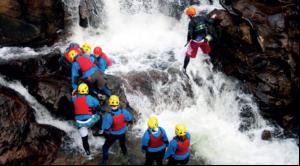David Ritchie from The Outward Bound Trust explains why an experiential approach to training that
involves taking risks in the wilderness can lead to improved health and safety in the workplace
David Ritchie from The Outward Bound Trust explains why an experiential approach to training that
involves taking risks in the wilderness can lead to improved health and safety in the workplace
It is well documented that millions of
work days and billions of pounds are
lost each year due to workplace
accidents and sickness. With this in
mind, employers seeking improvements
generally begin by investing in health and
safety equipment and procedures specific
to their industry. But evidence is growing
that a more imaginative approach,
focusing on actually experiencing risk in
safe, controlled yet unfamiliar situations
and environments can pay dividends in
improving health and safety standards.
The Outward Bound Trust last year
worked with over 2,500 employees from a
range of industries and achieved results for
organisations such as BAE Systems and the
National Grid. The Trust's approach is to
take training away from the office or
factory floor and into wilderness areas such
as the Lake District or Scottish Highlands
so that trainees learn the essential skills of
communicating effectively in high-risk
situations as well as the importance of
taking responsibility for their actions.
The crucial factor is the way in which
risk-taking during a Trust residential course
translates back into workplace attitudes and
behaviour, so each course is tailored to mirror
aspects of the real-life work situation of the
delegates. For example, the safety issues in
overhead power-line work have been
addressed with apprentices from the utilities
sector by undertaking rock climbing tasks.
Through this experiential method, risk
assessment moves from a paper exercise
to something more meaningful and
dynamic. By taking part in exercises
which pose a tangible risk, delegates gain
a better understanding of their own
behaviour and its impact on others, and
ultimately, have a greater awareness of the
responsibility they must take for their own
safety and that of their team.
The Trust helps participants to build a
deeper understanding of the importance of
communicating effectively with one another
in high risk situations. For example, where
an environment is noisy or confined, such as
during a gorge scrambling or caving task, the
focused reading of hand signals and body
language of colleagues is key to the team's
success and learning. In short, delegates learn
to think on their feet in a psychologically
stressful situation that they perceive to be
high risk, but which is actually safe.
Effective communication is clearly
paramount in improving safety but
essentials such as ensuring the correct
clothing and equipment are on hand, play a
crucial part. The Trust builds competence
in these areas by placing responsibility for
PPE on the delegate rather than the trainer.
Recent development work with rail sector
trackside employees highlighted the
logistical challenges of getting the
appropriate equipment to the right place at
the right time. Without planning, not only
are precious minutes wasted, but
employees might be tempted to carry out
the task without the correct gear, with
potentially disastrous consequences.
In 2011, Sir Roy McNulty identified
barriers to growth within rail, including
"relationships and culture within the
industry". At a time of considerable
challenge, the rail industry identified skills
gaps and a lack of effective communication
between experienced and new employees -
a cross-generational mismatch that was
having a negative effect on workplace safety.
The Trust worked with new talent in the
industry, helping them to build the skills
needed to generate authority and leadership,
influencing change from the bottom up.
Evaluating the benefits
The real question for employers is 'does
this benefit the company?' Feedback from
clients as diverse as Britvic Soft Drinks and
Rolls-Royce suggests that The Outward
Bound Trust's residential programmes have
a direct effect on confidence, decisionmaking
capability and safety. The National
Grid evaluated a 5-day Outward Bound
programme for engineering apprentices and
found that 100% of delegates improved their
planning and organisational skills while
other skills such as effective communication
and working responsibly scored 95%.
BAE Systems moved from a general
adventure training provider to a more
focused and experiential approach with
The Trust for its apprentices two years ago.
Courses designed to directly affect
workplace behaviour and safety awareness
were evaluated, and Ted Creighton, head
of learning and development at BAE
Systems, reported a change in apprentice
behaviours at work. "The course has
enabled these groups of apprentices to
have an enhanced sense of responsibility
and this has been reflected in an improved
safety record and also in our overall rates
of absenteeism," he says.
Given these results, it's fair to say many
accidents and lost working day rates can be
improved with an increase in the training
and development of employees. As a result,
it's likely that the experiential approach to
training will see a further rise in popularity
among employers, given its success in the
development of 'safe' behaviours.
David Ritchie is The Outward Bound Trust's
head of corporate business development


